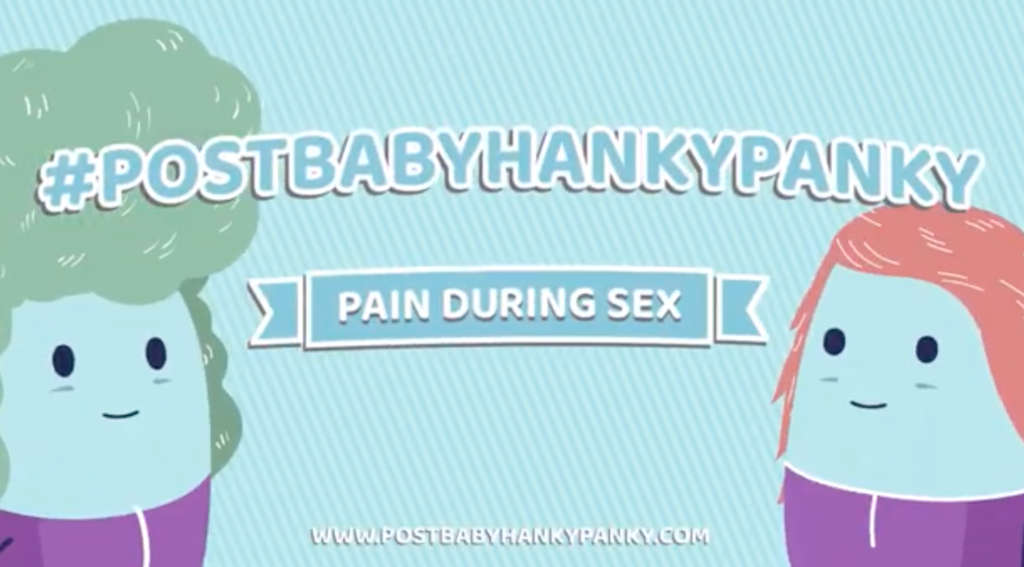Not tonight, baby: Understanding when a partner is not in the mood

By Maria Belen Field Lira This blog is a summary of our published article: Muise, A., Kim, J. J., Impett, E. A., & Rosen, N. O. (2017). Understanding when a partner is not in the mood: Sexual communal strength in couples transitioning to parenthood. Archives of Sexual Behavior, 46, 1993-2006. https://doi.org/10.1007/s10508-016-0920-2 Photo by Anna Shvets […]
New mothers’ sexual distress and sexual values in the transition to parenthood

By Heather Oliveira and Jackie Huberman This is a summary of our published article: Huberman, S. J., Allsop, D. B., & Rosen, N. O. (2022). Associations between new mothers’ partner-oriented sexual values and sexual distress in the transition to parenthood. The Journal of Sex Research, https://doi.org/10.1080/00224499.2022.2089969 Photo by Alena Shekhovtcova on Pexels The exciting changes that occur when becoming a new parent […]
Post baby hanky panky? For some women, it’s painful.

By Natalie Rosen This blog is a summary of our published article: Rosen, N. O., Dawson, S. J., Binik, Y. M., Pierce, M., Brooks, M., Pukall, C., Chorney, J., Snelgrove-Clarke, E., & George, R. (2022). Predictors of two trajectories of dyspareunia from pregnancy to 24 months postpartum. Obstetrics & Gynecology. https://doi.org/10.1097/AOG.0000000000004662 When new parents hear “post-baby-hanky-panky”, some […]
Depressed and distressed? Changes in new parents’ depressive symptoms and sexual concerns over time

By David B. Allsop; This blog is a summary of our published article: Dawson, S. J., Strickland, N. J., & Rosen, N. O. (2020). Longitudinal associations between depressive symptoms and sexual concerns among first-time parent couples during the transition to parenthood. The Journal of Sex Research. DOI: 10.1080/00224499.2020.1836114
Don’t hesitate, just regulate: Emotion regulation and women’s sexual well-being

By Justin Dube; This blog is a summary of our published article: Dubé, J. P., Dawson, S. J., & Rosen, N. O. (2020). Emotion Regulation and Sexual Well-being Among Women: Current Status and Future Directions. Current Sexual Health Reports, 1-10. https://doi.org/10.1007/s11930-020-00261-9
What is technology-facilitated sexual violence?

By Vasileia Karasavva With the surge in online access, technology has seemingly completely infiltrated our lives and has fundamentally changed the ways we interact with each other. Part of this change is for the better: along with the internet, we got cat memes, streaming services, and knowledge at our fingertips. Digital communication may also have […]
Mapping a course: Predicting outcomes of two treatments for women who have pain during sex

By Katrina Bouchard; This post is a summary of a recently published article from the Couples and Sexual Health Lab with our close collaborators at Université de Montréal:
Rosen, N. O., Vaillancourt-Morel, M.-P., Corsini-Munt, S., Steben, M., Delisle, I., Baxter, M.-L., & Bergeron, S. (2021). Predictors and moderators of provoked vestibulodynia treatment outcome following a randomized trial comparing cognitive-behavioral couple therapy to overnight lidocaine. Behavior Therapy. https://doi.org/10.1016/j.beth.2021.05.002
Let’s talk about stress, baby: Joint problem-solving and sexual distress across the transition to parenthood

By Grace Schwenck; This blog is a summary of our published article: Tutelman, P. R., Dawson, S. J., Schwenck, G. C., & Rosen, N. O. (2021). A Longitudinal Examination of Common Dyadic Coping and Sexual Distress in New Parent Couples during the Transition to Parenthood. Family Process. https://doi: 10.1111/famp.12661
It isn’t all talk: Couple therapy results in more improvements for women who have pain during sex relative to a common medical treatment

By Katrina Bouchard;
This post is a summary of a recently published article from the Couples and Sexual Health Lab with our close collaborators at Université de Montréal:
Bergeron, S., Vaillancourt-Morel, M.-P., Corsini-Munt, S., Steben, M., Delisle, I., Mayrand, M.-H., & Rosen, N. O. (2021). Cognitive-behavioral couple therapy versus lidocaine for provoked vestibulodynia: A randomized clinical trial. Journal of Consulting and Clinical Psychology, 89, 316-326. https://doi.org/10.1037/ccp0000631
Sexual Talk in Long-Term Relationships: What’s Being Left Under the Covers?

Believe it or not, the key to keeping sex exciting and satisfying in long term relationships may be communication! We know that sexual communication (e.g., couples having a conversation about their sexual preferences at a time when they are not engaging in sexual activity) is beneficial for the relationship and sexual well-being of couples [1]. But what about the potential benefits of communication during sex? Sexual talk refers to the communication that occurs between partners exclusively during sexual activity and that is about the sexual interaction itself (i.e., expressing to one’s partner the pleasure they feel while engaging in a sexual act) [2]. Yet, sexual talk has largely been kept under the covers一until now!

